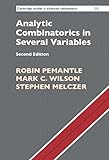Analytic combinatorics in several variables / by Robin Pemantle, Mark C. Wilson, and Stephen Melczer.
Material type: TextLanguage: English Series: Cambridge studies in advanced mathematics ; 212Publisher: Cambridge : Cambridge University Press, 2024Edition: 2nd edDescription: xix, 571 p. 23 cmISBN:
TextLanguage: English Series: Cambridge studies in advanced mathematics ; 212Publisher: Cambridge : Cambridge University Press, 2024Edition: 2nd edDescription: xix, 571 p. 23 cmISBN: - 9781108836623
- B217 R4 NBHM
| Item type | Current library | Home library | Call number | Status | Barcode | |
|---|---|---|---|---|---|---|
 Textual
Textual
|
Faculty of Mathematical Sciences Library | Central Science Library | B217 R4 NBHM (Browse shelf(Opens below)) | Available | SL1656234 |
Includes bibliographical references and index.
Discrete structures model a vast array of objects ranging from DNA sequences to internet networks. The theory of generating functions provides an algebraic framework for discrete structures to be enumerated using mathematical tools. This book is the result of 25 years of work developing analytic machinery to recover asymptotics of multivariate sequences from their generating functions, using multivariate methods that rely on a combination of analytic, algebraic, and topological tools. The resulting theory of analytic combinatorics in several variables is put to use in diverse applications from mathematics, combinatorics, computer science, and the natural sciences. This new edition is even more accessible to graduate students, with many more exercises, computational examples with Sage worksheets to illustrate the main results, updated background material, additional illustrations, and a new chapter providing a conceptual overview.
Develops classical tools in topology and analysis from a computational point of view to motivate the study of abstract mathematical theories, and to show how pure mathematics can be applied to concrete applications in mathematics, computer science, and the natural sciences
Provides an exposition that weaves in the considerable background material in a way that a graduate student can successfully tackle
Allows readers to replicate computations and check their work in Sage worksheets
Comprehensively surveys forty years of development of an emerging field, and shows that combinatorial problems can draw together many fields of mathematics, including algebraic geometry, harmonic analysis, and singularity theory
There are no comments on this title.

